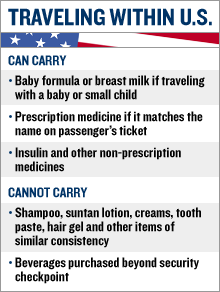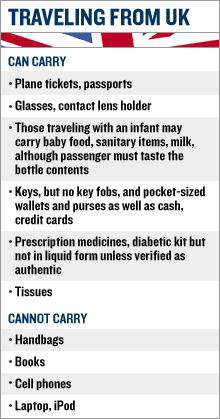|
Stay on top of carry-on restrictions for better travel With heightened airport security, know in advance what you can and cannot bring on board your flight. NEW YORK (CNNMoney.com) -- IPods are OK, but hand cream isn't. And don't even think about that bottle of water you just bought at the gift shop. With the discovery of a terrorist plot to bring down commercial aircraft with liquid-based explosives, air travelers must suddenly rethink what they can bring on board the plane.
U.S. travelers are facing a whole host of new rules about what they can bring with them for their flight and travelers flying out the United Kingdom face some of the most stringent restrictions about what they can carry on their flight. And since both government's have not said if, or when, the new security rules will be lifted, passengers could be stuck with these new rules for some time. Domestic flights not as strict As of Thursday, the Transportation Security Administration (TSA), which handles security screening for all major U.S. airports, said that it would no longer allow passengers to carry any liquids or gels on board any domestic or international flight, covering everything from shampoo to suntan lotion to the soft drink they may have purchased at the airport. Some consumer groups such as the International Airline Passengers Association the told CNN the new rules will be a "huge adjustment," especially for business travelers. While the new government restrictions only add to a growing list or rules that passengers must abide by, passengers traveling domestically will still be able to pass the time reading a book or magazine, listening to their MP3 player or working on a spreadsheet from their laptop. Following the September 11, 2001, attacks, authorities had banned passengers from carrying sharp objects such as knives, scissors and nail clippers. Passengers also were required to have their shoes examined after Briton Richard Reid tried to blow up a plane with a bomb hidden in his shoe. In December, the TSA repealed its decision to not allow passengers to carry scissors and small tools on board. Extreme restrictions for UK travel Travelers flying from the UK, however, face far more strict limits on what they can bring on board. Passengers cannot carry books, magazines and even cell phones onto the plane, according to Britain's Department of Transport, unless they were purchased after going through the security screening process. On top of that, UK security officials are requiring passengers to place their personal items including passports and wallets into a clear plastic bag and are not allowed to carry anything in their pockets, according to the government agency. The new rules even go so far as to require mothers who are carrying milk for their infants to taste the contents of the bottle. Air carriers, so far, have been sympathetic to the plight of travelers, who have been forced to ditch purchases, cram more items into their checked luggage or even rethink their trip. Both Delta Air Lines and American Airlines have waived their extra baggage fees on flights to and from the United Kingdom and are also allowing passengers who were scheduled to travel to Britain before Sept. 1 to make changes without being assessed a change fee. Some firms feeling the effect And while air travelers are inconvenienced, some related businesses are reporting a mixed message about the impact of the new travel restrictions. Package delivery giants FedEx and UPS report no increase in sales from customers wanting to ship their luggage, according to company spokespersons. But Gene Langenecker, CEO of The Luggage Club, and Jeff Boyd, president of the company Luggage Free said their respective luggage delivery firms experienced an immediate jump in inquiries. Both companies offer door-to-door delivery service, where they will pick up a customer's luggage, golf clubs or skis from their home and deliver it to their travel destination. "It's been insane," says Boyd, noting that the call volume the company has receive has been three times what it normally is. "As it becomes more and more difficult [to travel] more and more people see a value in our service." --additional reporting by CNN's David E. Williams ______________ |
|


